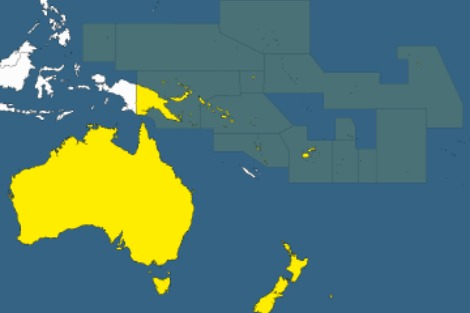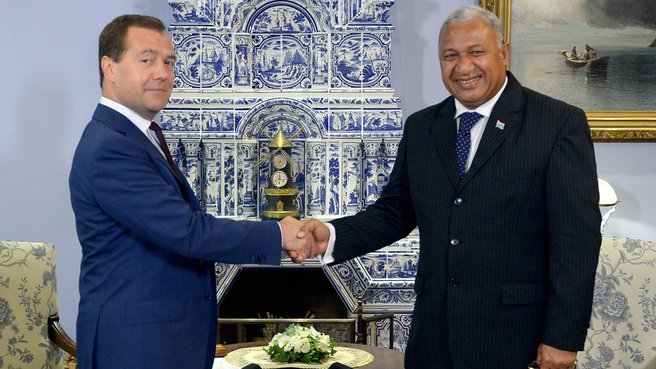OPINION:
New Zealand should be asking itself who rebuffed who in its difficult relationship with Fiji, writes Crosbie Walsh.
Our conflicting image of Fiji - popular tourist destination and unpopular military dictatorship - does little to help us unravel the extremely complex issues that confront this group of islands that are the geographic, communications and economic hub of the South Pacific.
In recent weeks there have been calls, in Australia and New Zealand, to revisit what some, including this writer, see as our failed policy on Fiji. Others, including Victoria University Professor Jonathon Fraenkel, say it is "far better to take the longer view, watch progress carefully on the domestic front, and keep up pressure against the harassment of Fiji's opposition parties, unions and civil society activists" because our "concessions" have been "repeatedly rebuffed" (Let's continue to put the heat on Fiji's strongman, August 14). And so it might seem. Fijian Prime Minister Frank Bainimarama has called New Zealand's recent lifting of some sanctions "insincere, unneeded and too late". But who first rebuffed who?
New Zealand imposed travel bans on almost everyone connected with the Bainimarama government - even Fiji's soccer goalkeeper chosen to play against us in a qualifying round of the World Cup.
Many Fijians now have close relatives living or studying overseas. They cannot risk being unable to visit them or seek treatment in our hospitals. Unable to recruit suitably qualified civilians, more military personnel were appointed to senior government positions - and a less tolerant approach to those who opposed the government ensued.
We voted for Fiji's suspension from the Commonwealth and the Pacific Islands Forum. Our efforts also led to the EU and Commonwealth withholding assistance to Fiji's vitally important sugar industry. Fiji responded by forming new international alliances, and it now chairs the UN Group of 77 and the International Sugar Organisation. It has revitalised the Melanesian Spearhead Group, and recently hosted the inaugural meeting of the Pacific Island Development Forum. These moves must weaken the forum, and with it, our influence in the Pacific.
Fiji now has a new constitution. It is not the constitution that many government opponents would prefer, but there are sound reasons for the amnesty and transitional clauses to which they object. It is unrealistic, for example, to expect Mr Bainimarama to hand over power to an interim government that could be dominated by his opponents. To do so, would risk losing all that the government thinks it has achieved, and the coup would have been to no purpose.
Mr Bainimarama's opponents give no credit for his promotion of a common national identity. All citizens are now "Fijian" irrespective of race; all can now proudly say they "belong". And for the first time, schools have civics classes to foster inter-racial understanding. One of the old political parties wants Fiji declared a Christian state, and another wants to retain the discriminatory race-based election system. Both want to restore power to ethnic Fijian chiefs who, before the 2006 coup, appointed the president, and dominated senate and most provincial appointments.
The "old political order" that Mr Bainimarama ousted favoured the urban elite and brought few improvements for the urban or rural poor. His reforms have seen much-needed action on a neglected infrastructure, rural and regional development, fair land leases, housing, education, health, work to reduce endemic corruption, and the now improving economy. His critics accentuate the negatives and recognise not one positive.
Not all is well in Fiji. It was not well in 2006. In some human rights areas it is not well now, but it is naive to think Fiji's major problems will be resolved by a partially, or even a fully, democratic government elected in September 2014.
But from my end of the binoculars, things are improving, and they could have been much better much earlier had the Australian and New Zealand governments adopted a more informed and flexible policy towards Fiji.
It is now nearly seven years since the 2006 coup. I see no evidence that the "heat" has produced any positive changes in or for Fiji, and I doubt it will in the future. Quite frankly, the policy has failed us and it has failed Fiji. New Zealand needs a new policy, not a slight easement of the same.
Crosbie Walsh is an Adjunct Professor of Development Geography at the University of the South Pacific, Suva, where he was the founding director of the Centre of Development Studies. Before this, he was the founding director of the Institute of Development Studies at Massey University. He is now retired.
Source: Dominion Post
Club Em Designs
Our conflicting image of Fiji - popular tourist destination and unpopular military dictatorship - does little to help us unravel the extremely complex issues that confront this group of islands that are the geographic, communications and economic hub of the South Pacific.
We too easily assume that "democratically elected" is good and
"military dictatorship" is bad. We seldom ask whether democracy is
always the best means of governance for all cultures, in all situations,
and in all countries, and we overlook the possibility that in some
situations democracy - and military dictatorships, for that matter - may
not be as they seem.
In recent weeks there have been calls, in Australia and New Zealand, to revisit what some, including this writer, see as our failed policy on Fiji. Others, including Victoria University Professor Jonathon Fraenkel, say it is "far better to take the longer view, watch progress carefully on the domestic front, and keep up pressure against the harassment of Fiji's opposition parties, unions and civil society activists" because our "concessions" have been "repeatedly rebuffed" (Let's continue to put the heat on Fiji's strongman, August 14). And so it might seem. Fijian Prime Minister Frank Bainimarama has called New Zealand's recent lifting of some sanctions "insincere, unneeded and too late". But who first rebuffed who?
Crosbie Walsh
" [T]he policy has failed us and it has failed Fiji. New Zealand needs a new policy, not a slight easement of the same "
" [T]he policy has failed us and it has failed Fiji. New Zealand needs a new policy, not a slight easement of the same "
New Zealand imposed travel bans on almost everyone connected with the Bainimarama government - even Fiji's soccer goalkeeper chosen to play against us in a qualifying round of the World Cup.
Many Fijians now have close relatives living or studying overseas. They cannot risk being unable to visit them or seek treatment in our hospitals. Unable to recruit suitably qualified civilians, more military personnel were appointed to senior government positions - and a less tolerant approach to those who opposed the government ensued.
We voted for Fiji's suspension from the Commonwealth and the Pacific Islands Forum. Our efforts also led to the EU and Commonwealth withholding assistance to Fiji's vitally important sugar industry. Fiji responded by forming new international alliances, and it now chairs the UN Group of 77 and the International Sugar Organisation. It has revitalised the Melanesian Spearhead Group, and recently hosted the inaugural meeting of the Pacific Island Development Forum. These moves must weaken the forum, and with it, our influence in the Pacific.
Fiji now has a new constitution. It is not the constitution that many government opponents would prefer, but there are sound reasons for the amnesty and transitional clauses to which they object. It is unrealistic, for example, to expect Mr Bainimarama to hand over power to an interim government that could be dominated by his opponents. To do so, would risk losing all that the government thinks it has achieved, and the coup would have been to no purpose.
Mr Bainimarama's opponents give no credit for his promotion of a common national identity. All citizens are now "Fijian" irrespective of race; all can now proudly say they "belong". And for the first time, schools have civics classes to foster inter-racial understanding. One of the old political parties wants Fiji declared a Christian state, and another wants to retain the discriminatory race-based election system. Both want to restore power to ethnic Fijian chiefs who, before the 2006 coup, appointed the president, and dominated senate and most provincial appointments.
The "old political order" that Mr Bainimarama ousted favoured the urban elite and brought few improvements for the urban or rural poor. His reforms have seen much-needed action on a neglected infrastructure, rural and regional development, fair land leases, housing, education, health, work to reduce endemic corruption, and the now improving economy. His critics accentuate the negatives and recognise not one positive.
Not all is well in Fiji. It was not well in 2006. In some human rights areas it is not well now, but it is naive to think Fiji's major problems will be resolved by a partially, or even a fully, democratic government elected in September 2014.
But from my end of the binoculars, things are improving, and they could have been much better much earlier had the Australian and New Zealand governments adopted a more informed and flexible policy towards Fiji.
It is now nearly seven years since the 2006 coup. I see no evidence that the "heat" has produced any positive changes in or for Fiji, and I doubt it will in the future. Quite frankly, the policy has failed us and it has failed Fiji. New Zealand needs a new policy, not a slight easement of the same.
Crosbie Walsh is an Adjunct Professor of Development Geography at the University of the South Pacific, Suva, where he was the founding director of the Centre of Development Studies. Before this, he was the founding director of the Institute of Development Studies at Massey University. He is now retired.
Source: Dominion Post
Club Em Designs





 Jemma
Williams has an honours degree in international studies specialising
in international development. She currently works for the Australian
Fair Trade and Investment Network.
Jemma
Williams has an honours degree in international studies specialising
in international development. She currently works for the Australian
Fair Trade and Investment Network.














